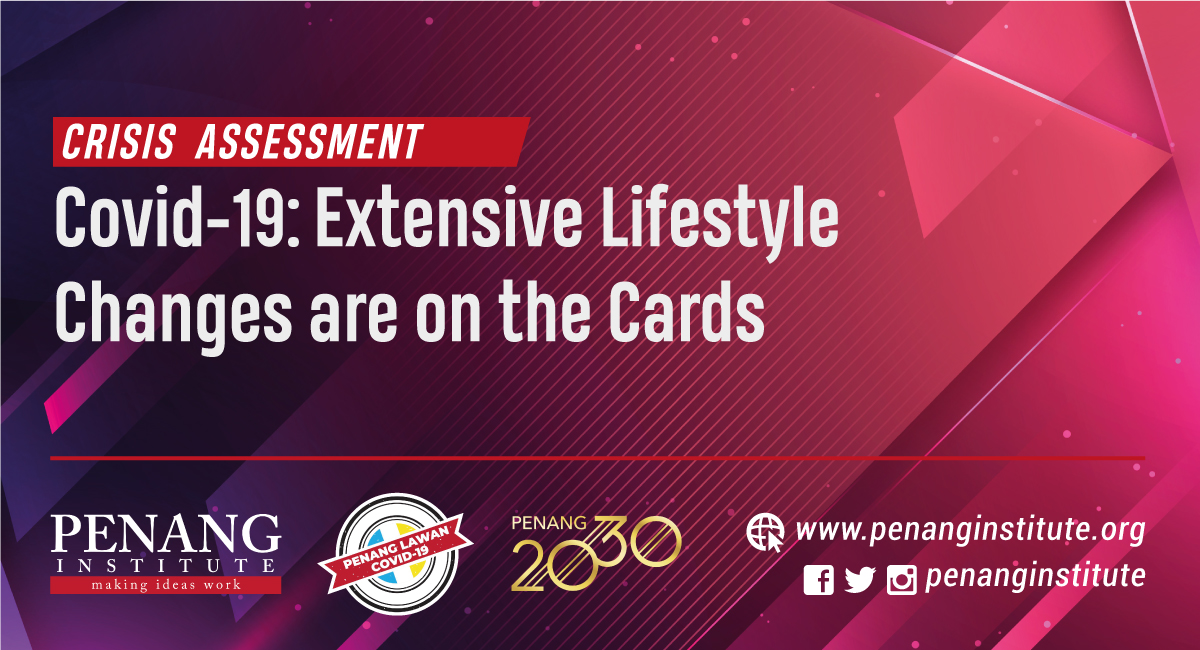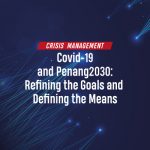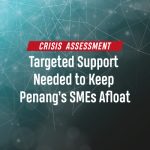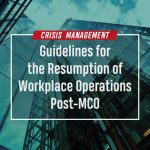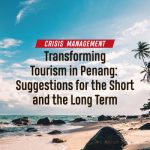EXECUTIVE SUMMARY
- Serious disease outbreaks tend to reorganize daily lifestyles. The Covid-19 pandemic, being the worst in living memory to hit the world, will definitely have a profound impact on social behaviour, especially among urban populations.
- Lockdowns and Movement Control Orders (MCO) have most immediately disrupted lifestyles, in the process accelerating the adoption of “digital lifestyles” throughout society. This hasty change has exacerbated major challenges that governments were already facing before the pandemic, such as weak infrastructure, cybersecurity failings, and fake news. At the same time, new opportunities have appeared.
- The Department of Statistics reveals that self-employed persons have been the most vulnerable: Only 25.1 per cent of self-employed individuals were able to work from home, and 46.6 per cent lost their jobs, the highest rate among all employment groups.
- At the same time, 71.4 per cent of self-employed individuals were not able to make their savings last beyond one month, and two in five (43 per cent) could sustain themselves for less than two weeks.
- Some changes in lifestyle are studied in this article under the rubric of “Fundamental lifestyle”, “Learning lifestyle”, “Working lifestyle” and “Leisure lifestyle”.
INTRODUCTION
There have been many cases in history where diseases have shocked populations into changing their lifestyle radically.
The outbreak of cholera in between 1852 and 1859, for example, devastated Asia, Europe, North America, and Africa; 23,000 people were killed in Britain alone in 1854. But when it was realised that the disease was water-borne, an elaborate sewer network was developed to keep waste from getting into the water supply. This was a radical initiative, and it was even claimed that “the need for a new and modern sewerage system may never have been identified” if the devastating cholera outbreaks had not occurred.
The 1918 influenza pandemic infected one-third of the world’s population, and killed between 50 million to 100 million people. Given the post-war conditions then, efforts taken worldwide were limited to non-pharmaceutical interventions, such as quarantine, good personal hygiene, and limiting public gatherings. And no vaccine ever appeared. It is claimed by some that the lessons learned from that specific pandemic lie behind the public health measures now employed to deal with the novel coronavirus, and these are now being considered the 1918 influenza pandemic’s “most enduring effects”.
Urban sanitation was thus improved thanks to the cholera outbreaks, while the 1918 influenza pandemic noticeably changed certain public behaviour in the United States, such as the prohibiting of spitting in public and the dismissing of roller towels and common drinking cups in public restrooms.
Both the cholera and 1918 influenza outbreaks brought about “broad improvements to standards of living and health outcomes across the world”. Judging from this, the Covid-19 pandemic, having hit the world so severely, should therefore entail significant changes in public behaviour as well.
FUNDAMENTAL LIFESTYLE
The term “lifestyle” signifies people’s ordinary everyday social life, such as “what they do”, “why they do it”, and “what doing it means to them and others”. Briefly, “lifestyle” may be simply defined as “mode of living”. Breathing, drinking, and eating are the most essential things we do in daily life; and how these activities are done defines the term “fundamental lifestyle” as understood in this article.
Human beings are able to last for three weeks without food, and three days without water, but only three minutes without air. Diseases that attack our ability to breathe are therefore bound to cause more immediate panic than other types of diseases would.
With the spread of Covid-19 and the subsequent imposition of social distancing measures, global carbon emissions are expected to be reduced by five per cent this year due to restrictions on travel, work, and industry. In Malaysia, the air quality has significantly improved under the Movement Control Order (MCO). There has been a decrease of between 48 per cent and 75 per cent in nitrogen dioxide in the air, and of 23 per cent to 34 per cent in sulphur dioxide from 1st to 25th March 2020.
At the same time, food delivery services have grown strongly. For example, Grab saw an increase in demand for such services of over 30 per cent.
Changes in fundamental lifestyle, and the influence Covid-19 has exerted on other aspects of daily life, such as in learning, working, and leisure, are discussed below.
LEARNING LIFESTYLE
The outbreak of Covid-19 led to temporary closure of educational institutions, affecting more than 1.57 billion learners, i.e. 91.3 per cent of the world’s enrolled learners population. Consequently, online learning or remote learning is being increasingly offered by institutions to make learning available from home.
In Malaysia, a total of 7,962,033 learners are affected by the closure of educational institutions. These institutions have meanwhile embraced online learning or remote learning as “the only option available for students to resume learning” during this period.
Different means such as Telegram, WhatsApp, Zoom or Google Meet have been utilized by teachers, and assigned tasks are submitted via any available platform, including messaging, sending a photo of the tasks, voice notes, emails, or Google Classroom. Both synchronous modes via “live sessions” and asynchronous modes via recorded sessions have been utilised in higher education under the MCO.
To facilitate adoption of alternative learning methods, a list of available digital platforms and resources have been introduced by the Malaysia Digital Economy Corporation (MDEC) for teachers and students. Parents have also been asked to guide their children by subscribing to online learning resources.
However, the suddenness of this change poses a distressing challenge to educators who are not well-versed with the technology and platforms used. This applies to learners as well. Parents who work from home while their children are also learning from home come under great stress as well. Managing all this within the confines of the home becomes a new art to master. Also, not all families have access to enough devices to accommodate remote learning for the kids and working from home for the parents at the same time. Enhancing access to reliable internet connections has now gained added urgency.
WORKING LIFESTYLE
Full or partial workplace closures have affected as much as 81 per cent of the world’s workforce of 3.3 billion. Mandatory work-from-home policies have been rolled out by global companies such as Google, Microsoft, Twitter, Hitachi, Apple, Amazon, Chevron, Salesforce, and Spotify. In Malaysia, the most common platforms used to stay connected from home include WhatsApp, Google Meet, Skype, Microsoft Teams, text messages, and conventional phone calls.
However, working remotely is still in its early stages in Malaysia. The reality of working remotely goes beyond “having a laptop and a broadband”, and related equipment are often not up to standard, and virtual meetings interrupted by “echo-ey and boom-y” sounds are not uncommon. The required updating of software is often glaringly obvious, and may require additional professional assistance that is not available during MCO. All in all, poor data connectivity can be an annoyance, and not conducive to the creating of a sense of teamwork and common purpose which is essential to work-from-home arrangements.
Some workers may also not have adequate or comfortable working space at home. In addition, the work-from-home arrangement is not really possible or suitable for many types of jobs.
A survey conducted by the Department of Statistics, Malaysia reveals that self-employed persons have been the most vulnerable during the pandemic. Only one in four (25.1 per cent) self-employed individuals were able to work from home while 23 in 50 (46.6 per cent) have lost their jobs, the highest rate among different employment groups. At the same time, more than two thirds (71.4 per cent) of self-employed individuals were not able to make their savings last beyond one month, and two in five (43 per cent) could sustain themselves for less than two weeks.
Some businesses have started re-strategizing operation by utilising technology. For example, food services now rely on Facebook, WhatsApp, and other social media platforms to advertise, to offer discounts and to take orders.
Even hawkers have been pushed onto online platforms. Famously noted as “the first platform of its kind directing more traffic to Malaysian hawkers”, “The Hawkers” application provides a list of food stalls that cover areas such as Penang, Selangor, Kuala Lumpur, Negeri Sembilan, and Johor, giving people who are often digital illiterates an online presence. In Penang, as many as 112 hawker centres shifted their businesses to “Jom Beli Online @ MBPP”, an online platform introduced by the Penang Island City Council.
LEISURE LIFESTYLE
Leisure can be briefly understood as “a range of activities in which people choose to participate during their free time” or simply as “relaxation from work”, be these activities that are active (such as games, sport, and recreation) or passive (such as music and cinema).
The MCO has shifted most of leisure activities indoors. In line with this, performing arts, such as music and theatre, have also availed themselves of virtual platforms to retain public interest, and to contribute to the array of online entertainment available the world over.
As many as 85 per cent of British households are classified to be utilising the current period “productively”. Various classical music organisations such as the New York Philharmonic and the London Symphony Orchestra, have either shifted their performances to live-streaming or made their concert archives available online. Music has been pointed out as “a good tonic to cope with stress and uncertainty” during these trying times.
Another innovative example are South African safari tours. These have also gone virtual. People from all over the world can now watch live broadcasts of safaris from their home. An “amazing explosion” in audience numbers has been reported for the live streaming of “WildEarth”. The subsequent question is about the financial viability of such initiatives: how can this be monetized in the long run, and how can it adapt to the new and reduced movement patterns of the world traveller, post-Covid-19?
In Malaysia, the spread of Covid-19 has also resulted in the shutting of all non-essential businesses. For example, cinemas have been closed to prevent mass gatherings. Most people have subsequently switched to alternative platforms such as Netflix, HyppTV, and Astro on Demand, to watch at home.
Unable to spend time with friends or meet up for outdoor activities, many have also turned to online platforms to continue staying in touch with friends. For example, playing online games with friends and inviting friends for online quizzes are not unfamiliar these days. Virtual catch-up with friends via social media or video-conferencing platforms is also another common way of maintaining a leisure lifestyle while locked down at home.
Many have begun searching fervently for online activities and entertainment. This trend is witnessed in Internet use increasing by more than 30 per cent, particularly in the search for entertainment, communication, and gaming apps and sites.
This growth in traffic saw an increase by 195 per cent for Netflix, and by 232 per cent for the homegrown video streaming service “Tonton”. At the same time, the music streaming platform “Joox” witnessed an increased usage rate of nearly 50 per cent for its exclusive karaoke function while its desktop login rate increased by 20 per cent, showing that “the pandemic has not affected Malaysians’ love for singing”.
Outdoor recreational activities such as hiking, jogging, and cycling have not been allowed under the MCO. This even includes outdoor activities, such as jogging, within gated communities. With fitness centres, public parks, and swimming pools closed, Malaysians have shifted to home-based workouts, using skipping ropes and resistance band, for example, and even following exercises online to do planking, stretching, and Tabata burpees.
THE WAY FORWARD
It might still be too early to conclude that daily lifestyles will be greatly transformed by Covid-19, but it is nevertheless true that the pandemic has already left a strong impression on various dimensions in our daily life. The way we get our meals, the way we school our children, how we work, and how we exercise and entertain ourselves have all been affected dramatically.
At the same time, new opportunities for certain groups of people have appeared. For example, food delivery services are in great demand, and a spike in the hiring of delivery personnel has been noted, boosted by newly unemployed people looking for work. Foodpanda Malaysia, for example, has witnessed an increase of 37% in application for the position of delivery men.
Playing online games, watching online animation, or surfing for online content has also increased. As a result, the local digital content creation industry is expected to “push to meet market needs” in creating content that can “boost family relationship, inspire creativity among youths and energise positive innovation for the entire family” during this period. The downside to this is that the internet speed in certain area remains slow even as the average speed has been interrupted by the massive use of the internet. Investment in the digital infrastructure should therefore be a top priority, both for the government and other stakeholders.
Policy makers will also have to ensure that all types of employment, including self-employed persons, will benefit from the stimulus packages and other relevant policies. Self-employed individuals are categorized as “unprotected workers” by the International Labour Organization, (ILO), meaning that they are outside paid or sick leave mechanisms, and “are less protected by conventional social protection mechanisms and other forms of income smoothing”. They are a group that will need special attention.
In the United Kingdom, self-employed people have been aided by certain initiatives. For instance, those who have lost income may claim a grant through the Coronavirus (Covid-19) Self-employment Income Support Scheme. There are 5.03 million self-employed persons in the United Kingdom and as many as 95 per cent of them are covered under the scheme . Alternatively, people who are self-employed or are getting less work or no work may apply for “Universal Credit” and/or “New Style Employment and Support Allowance”.
Malaysian policymakers should consider the framework for helping self-employed persons proposed by the ILO which includes: (i) social protection through existing schemes and/or ad-hoc payments, such as access to unemployment benefits, social assistance, and public employment programmes, for self-employed individuals, and (ii) time-bound financial or tax relief and income smoothing measures, such as subsidies, credit mediation or refinancing to overcome liquidity constraints, to support business continuity for self-employed persons.
The increasing adoption of technology also means that citizens are now more exposed to cyber threats. Under the MCO, increased cybersecurity cases have included fraud (such as scams and phishing), intrusion (such as hacking and data breach attempts), and cyber harassment (including cyberstalking). There has been a spike by a whopping 82.5 per cent; 18 per cent of the total 838 cases involved companies while the rest affected home users and others. The pandemic, it has been noted, has created a “perfect storm for cyberattacks”.
As more citizens adapt to a digital lifestyle, fake news becomes an ever greater problem. Facebook took the initiative to remove false claims identified by its global network of fact-checkers. In Malaysia, over 180 investigations have been opened on fake news that are specifically on Covid-19.
There are currently 10,733 cybersecurity professionals in Malaysia, meaning a ratio of one such professional to 2,600 internet users in the country. More are needed.
Raising public awareness about cybersecurity and fake news is an important step in empowering citizens while they adapt to digital lifestyles. As with safety in the physical world, a guide for self-protection in the digital world is a vital affair. The public should also be directed and guided by the relevant authorities to be discriminate about sources of information; the initiative “sebenarnya.com” should be made more known to everyone. Once citizens are better equipped with awareness and critical thinking, they would be able to filter dubious information and to think twice before forwarding any information.
As conventional lifestyles get disrupted, it is essential for everyone to adapt ourselves to emerging digital lifestyles. By all accounts, these are what is digging the path to the “new normal”. The pandemic has shown us that our lifestyles cannot really be “self-centric”, but are really interrelated to all other individuals. In essence, a change in individual lifestyle will also signal the types of jobs that are to appear in the future.
Strengthening the digital infrastructure, enhancing cybersecurity and combating fake news would make for more sustained and rewarding digital lifestyles.
REFERENCES
AFP. (2020, April 10). Virus lockdown boosts South African virtual safari tours. The Star. Retrived from https://www.thestar.com.my/tech/tech-news/2020/04/10/virus-lockdown-boosts-south-african-virtual-safari-tours
Ambrose, J. (2020, April 12). Carbon emissions from fossil fuels could fall by 2.5bn tonnes in 2020. The Guardian. Retrieved from https://www.theguardian.com/environment/2020/apr/12/global-carbon-emisions-could-fall-by-record-25bn-tonnes-in-2020
Begum, M. (2020, April 6). Cinemas in Malaysia closed throughout April. The Star. Retrieved from https://www.thestar.com.my/lifestyle/entertainment/2020/04/06/cinemas-in-malaysia-closed-throughout-april
Bernama. (2020, April 4a). F&B operators navigate through MCO to sustain business. The Star. Retrieved from https://www.thestar.com.my/business/business-news/2020/04/04/fb-operators-navigate-through-mco-to-sustain-business
Bernama. (2020, April 4b). No compromise with those who spread fake news: Ismail Sabri. The Sun Daily. Retrieved from https://www.thesundaily.my/local/no-compromise-with-those-who-spread-fake-news-ismail-sabri-IA2211138
Bernama. (2020, March 21). Food delivery services give vital help to restaurateurs, public. The Sun Daily. Retrieved from https://www.thesundaily.my/local/food-delivery-services-give-vital-help-to-restaurateurs-public-BA2165298
Camoens, A. (2020, March 19). Police: Exercises at home, refrain from recreational activities during MCO period. The Star. Retrieved from https://www.thestar.com.my/news/nation/2020/03/19/police-exercise-at-home-refrain-from-recreational-activities-during-mco-period
Centers for Disease Control and Prevention. (2019, March 20). 1918 pandemic (H1N1 virus). Centers for Disease Control and Prevention. Retrieved from https://www.cdc.gov/flu/pandemic-resources/1918-pandemic-h1n1.html
Chaney, D. (1996). Lifestyles. London: Routledge.
Chin, C. (2020, March 29). Learning mustn’t stop with COVID-19. The Star. Retrieved from https://www.thestar.com.my/news/education/2020/03/29/learning-mustnt-stop-with-covid-19
Chung, N. (2020, March 21). MCO sees more people turning delivery men. Free Malaysia Today. Retrieved from https://www.freemalaysiatoday.com/category/nation/2020/03/31/mco-sees-more-people-turning-delivery-men/
Department for Work and Pensions. (2020, April 8). Guidance – Coronavirus (COVID-19): What to do if you are self-employed and getting less work or no work. GOV.UK. https://www.gov.uk/guidance/coronavirus-covid-19-what-to-do-if-youre-self-employed-and-getting-less-work-or-no-work
Department of Statistics, Malaysia. (2020). Report of special survey on Effects of COVID-19 on Economy and Individual (Round 1). Putrajaya: Department of Statistics, Malaysia.
Dowling, S. (2020, March 3). Coronavirus: What can we learn from the Spanish flu? BBC. Retrieved from https://www.bbc.com/future/article/20200302-coronavirus-what-can-we-learn-from-the-spanish-flu
Farik Zolkepli & Sivanandam, H. (2020, March 28). MCO compliance at 97% but 482 arrests over March 26-27. The Star. Retrieved from https://www.thestar.com.my/news/nation/2020/03/28/mco-compliance-at-97-but-482-arrests-over-march-26-27
Hanna Sheikh Mokhtar. (2020, March 31). Teacher explore online teaching methods during MCO. New Straits Times. Retrieved from https://www.nst.com.my/education/2020/03/579992/teachers-explore-online-teaching-methods-during-mco
Haywood, L., Kew, F., Bramham, P., Spink, J., Capenerhurst, J., & Henry, I. (1995). Understanding Leisure (2nd ed.). Cheltenham: Stanley Thornes (Publishers).
History.com Editors. (2020, March 24). Cholera. History. Retrieved from https://www.history.com/topics/inventions/history-of-cholera
HM Revenue & Customs. (2020, March 26). Guidance: Claim a grant through the coronavirus (COVID-19) Self-employment Income Support Scheme. GOV.UK. https://www.gov.uk/guidance/claim-a-grant-through-the-coronavirus-covid-19-self-employment-income-support-scheme
HM Treasury, & Sunak, R. (2020, March 26). Chancellor gives support to millions of self-employed individuals. GOV.UK. Retrieved from https://www.gov.uk/government/news/chancellor-gives-support-to-millions-of-self-employed-individuals
International Labour Organization. (2020). COVID-19 and the world of work: Impact and policy responses. Geneva: International Labour Organization.
International Labour Organization. (2020, April 7). ILO: COVID-19 causes devastating losses in working hours and employment. International Labour Organization. Retrieved from https://www.ilo.org/global/about-the-ilo/newsroom/news/WCMS_740893/lang–en/index.htm
Lim, S. (2020, April 6). The Hawkers empowers hawkers stall owners with an online presence for takeaways and deliveries. Tatler. Retrieved from https://my.asiatatler.com/dining/the-hawkers-empowers-hawker-stall-owners-with-an-online-presence-for-takeaway-and-deliveries
Lufkin, B. (2020, March 13). Coronavirus: How to work from home, the right way. BBC. Retrieved from https://www.bbc.com/worklife/article/20200312-coronavirus-covid-19-update-work-from-home-in-a-pandemic
Malay Mail. (2020, March 24). COVID-19 shutdown tests readiness to work from home in Malaysia. Malay Mail. Retrieved from https://www.malaymail.com/news/malaysia/2020/03/24/covid-19-shutdown-tests-readiness-to-work-from-home-in-malaysia/1849672
Malaysian Digital Association (MDA). (2020, March 31). MDA releases report on Covid-19 lockdown: Malaysians go online for work, food and TV. Malaysian Digital Association. Retrieved from http://www.malaysiandigitalassociation.org.my/report/mda-report-similarweb-mar-2020-2/
Malaysia Digital Economy Corporation (MDEC). (2020). Overcoming the challenges of COVID-19 with digital technology. MDEC. Retrieved from https://mdec.my/digitalvscovid-the-general-public/
Malaysia Digital Economy Corporation (MDEC). (2020, March 26). Positive impact of COVID-19? The digital content industry explodes. MDEC Soundbytes: Insights within Malaysia Digital Economy. Retrieved from https://mdec.my/blog/?p=468
Nambiar, P. (2020, April 1). 30% spike in internet usage during MCO but TM says it can handle more. Free Malaysia Today. Retrieved from https://www.freemalaysiatoday.com/category/nation/2020/04/01/30-spike-in-internet-usage-during-mco-but-tm-says-it-can-handle-more/
Nur Zarina Othman. (2020, April 1). Tech world sees demand surge during MCO. New Straits Times. Retrieved from https://www.nst.com.my/lifestyle/bots/2020/04/580235/tech-world-sees-demand-surge-during-mco
Office for National Statistics, the United Kingdom. (2020, March 17). Labour market economic commentary: March 2020. Office for National Statistics. Retrieved from https://www.ons.gov.uk/employmentandlabourmarket/peopleinwork/employmentandemployeetypes/articles/labourmarketeconomiccommentary/march2020
Ott, M., Shaw, S. F., Danila, R. N., & Lynfield, R. (2007). Lessons learned from the 1918-1919 influenza pandemic in Minneapolis and St. Paul, Minnesota. Public Health Reports, 122(6), 803-810.
Ramasami, V. (2020, April 4). Working remotely will test employee creativity, productivity. New Straits Times. Retrieved from https://www.nst.com.my/opinion/letters/2020/04/581131/working-remotely-will-test-employee-creativity-productivity
Royal Philharmonic Orchestra. (2020, April 8). Coronavirus isolation prompting a quarter of Brits to learn more about Classical music. Royal Philharmonic Orchestra. Retrieved from https://www.rpo.co.uk/about/news-press/80-news/414-new-media-driving-a-resurgent-interest-in-orchestral-music-amongst-the-young-2
Sani, R. (2020, April 15). Readiness for continuity in online learning. New Straits Times. Retrieved from https://www.nst.com.my/education/2020/04/584436/readiness-continuity-online-learning
Sekaran, R. (2020, April 10). Penang’s food delivery platforms get positive response from hawkers. The Star. Retrieved from https://www.thestar.com.my/news/nation/2020/04/10/penang039s-food-delivery-platforms-get-positive-response-from-hawkers
Shenker, J. (2020, March 26). Cities after coronavirus: How COVID-19 could radically alter urban life. The Guardian. Retrieved from https://www.theguardian.com/world/2020/mar/26/life-after-coronavirus-pandemic-change-world
Sobel, M. E. (1981). Lifestyle and social structure: Concepts, definitions, analyses. New York: Academic Press.
Synder, M. R., & Ravi, S. J. (2018). 1818, 1918, 2018: Two centuries of pandemics. Health Security, 16(6), 410-415.
The Star. (2020, March 21). Active Malaysians getting fit at home. The Star. Retrieved from https://www.thestar.com.my/news/nation/2020/03/21/active-malaysians-getting-fit-at-home
Tilden, I. (2020, April 15). Lockdown listening: Classical music and opera to stream at home. The Guardian. Retrieved from https://www.theguardian.com/music/2020/mar/16/classical-music-opera-livestream-at-home-coronavirus
Torell, E. (2020, April 7). UNMC History: The 1918 flu pandemic. University of Nebraska Medical Center. Retrieved from https://www.unmc.edu/news.cfm?match=25312
UNESCO. (2020). COVID-19 educational disruption and response. UNESCO. Retrieved from https://en.unesco.org/covid19/educationresponse
White, F., Stallones, L., & Last, J. M. (2013). Global public health: Ecological foundations. New York: Oxford University Press.
Yuen, M. (2020, April 12). Cybersecurity cases rise by 82.5%. The Star. Retrieved from https://www.thestar.com.my/news/focus/2020/04/12/cybersecurity-cases-rise-by-825
Yuen, M. (2020, March 22). In need of cybersecurity experts. The Star. Retrieved from https://www.thestar.com.my/news/focus/2020/03/22/in-need-of-cybersecurity-experts
Yuen, M., Koh, W., & Pfordten, D. (2020, March 29). An MCO ‘side-effect’: A breath of fresh air. The Star. Retrieved from https://www.thestar.com.my/news/focus/2020/03/29/an-mco-side-effect-a-breath-of-fresh-air
You might also like:
![Covid-19 and Penang2030: Refining the Goals and Defining the Means]()
Covid-19 and Penang2030: Refining the Goals and Defining the Means
![Targeted Support Needed to Keep Penang's SMEs Afloat]()
Targeted Support Needed to Keep Penang's SMEs Afloat
![Guidelines for the Resumption of Workplace Operations Post-MCO]()
Guidelines for the Resumption of Workplace Operations Post-MCO
![Covid-19 Set to Aggravate Malaysia’s Skills Mismatch]()
Covid-19 Set to Aggravate Malaysia’s Skills Mismatch
![Transforming Tourism in Penang: Suggestions for the Short and the Long Term]()
Transforming Tourism in Penang: Suggestions for the Short and the Long Term

